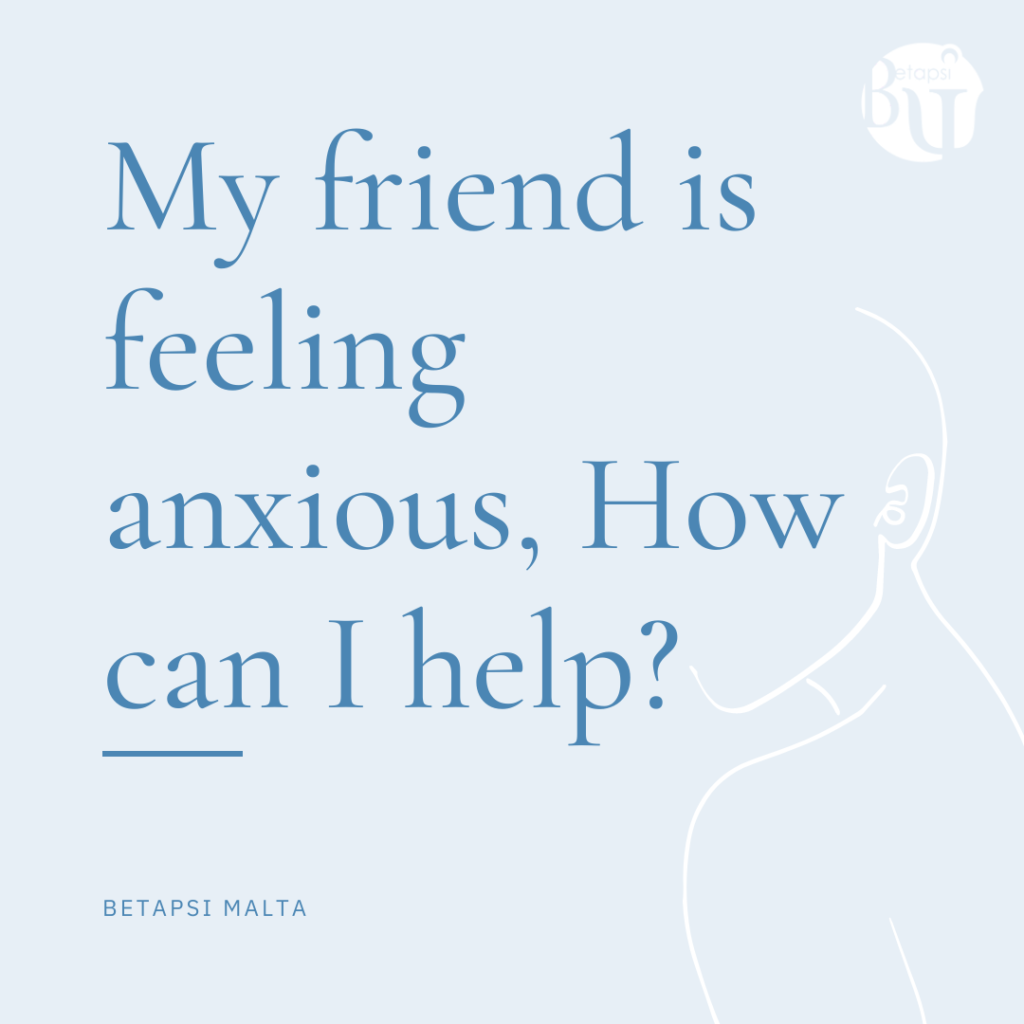
In this day and age, I am quite certain that everyone has heard of the term anxiety, which has been chosen as the theme for this year’s Mental Health Awareness Week. Most of us have probably encountered someone who has said that he or she is suffering from anxiety. Despite most people being familiar with this term, however, people may still struggle to understand it. What does anxiety feel like, for one thing? And how do you respond to a friend or family member who tells you they are struggling with anxiety?
When considering the various problematic issues that are currently facing today’s societies, one will be able to easily understand why anxiety is increasing amongst today’s generations, as well as why it has been chosen as the theme for this year. Such problems include the constant validation people, especially the younger generations, crave through their social media platforms, and the increasing need for academic validation in a world where academia is viewed as the necessary ingredient to so many accomplishments in life. Furthermore, the world is now facing issues related to inflation in all sectors we can possibly imagine as a result of both the recent COVID-19 pandemic and the ongoing war between Russia and Ukraine, and the list goes on and on. Before delving deeper into what anxiety is, it would be worth to familiarise ourselves with some of the feelings that accompany anxiety, such as feelings of uncertainty, loneliness, frustration, and sadness, and perhaps in more extreme cases, feelings related to depression. Having mentioned these, one can imagine that anxiety may then lead to people feeling isolated and emarginated. Additionally, it can make one lose confidence in themselves and in their capabilities because of a low self-efficacy or it may make them feel angry and frustrated both towards themselves and others. Sometimes it may even lead to depression or some general anxiety disorder, and in some extreme cases, anxiety can also lead to suicide.
These previously mentioned consequences of anxiety may come across as quite severe, and if one is not aware of the different types of anxiety, these might leave this person feeling quite shocked. What I mean is that, realistically, all of us have felt those butterflies flattering in our stomach before entering an exam room, going for our first job interview, giving a performance or presentation, or even before meeting someone for the first time, and in such situations, all of us probably said “I am feeling so anxious”. However, just because a person goes through these brief moments of anxiety, it does not necessarily mean that that individual is suffering from an anxiety disorder or is going to end up feeling lonely and depressed.
First of all, even anxiety arising from the smallest of reasons, like feeling anxious because of needing to go to a GP for a checkup, may lead to more severe anxiety and problems if it is not addressed appropriately. Thus, even though it may not necessarily lead to more severe consequences, it does not mean that this is impossible. This sheds light onto the fact that we should never ignore people when they claim to be feeling anxious, or belittle or ridicule their feelings of anxiety. Rather, we should focus on listening to their concerns and providing them with support in the best possible ways. Furthermore, is it also important to understand that sometimes we cannot really pinpoint the root cause of anxiety and the person may very well be unaware of it themselves. In other cases, there may even be no apparent cause at all.
Some people with issues of anxiety do not only feel that anxious feeling before some important or major event in their lives, but also tend to live with that feeling of anxiety throughout every moment of their lives. People with these levels of anxiety, in which cases anxiety is likely to be indicative of some mental health issue, simply feel anxious about practically all they do. This means that they might feel anxious about being themselves or about being in their body, they might feel anxious after having a conversation with a friend because of the fear of having said something wrong, they might feel anxious for going out because they feel as if their presence is a nuisance to others, and they might feel anxious about going to school because they feel as if they’re just wasting their parents’ money. In other words, they feel anxious about doing all sorts of things. Naturally, one can imagine that living with this sort of anxiety is far more difficult than feeling a little anxious before an exam, and it is in these more severe cases that people with anxiety might start experiencing certain feelings of loneliness and depression, which potentially might have very negative consequences on an individual’s life. While keeping in mind this contrast between the different kinds of anxieties, it is important to remember that these severe issues of anxiety may very well be a result of some minor stressors and anxieties which would not have been tackled well, and so once again, remember that we should never ignore any feelings of anxiety or label such feelings as “irrelevant”. Having mentioned that, however, sometimes, anxiety truly has no cause to it, or even if there is a cause, sometimes it seems to be a mystery to everyone, including the person going through it all. So, it is of utmost importance for us to understand how to approach a person with anxiety, as even the happiest and most cheerful person we know might have problems with anxiety. A recent systematic review and meta-analysis by Sacco, Camilleri, et al., suggests that one in every five European young people suffer from some mental health disorder, and most of these people suffer from anxiety. Hence, anxiety was found to be the most common psychological disorder in the European population.
This brings us to a very interesting point and often asked question: what shall I do when a loved one is going through a difficult period of anxiety? This question is particularly relevant because people suffering from anxiety, whether severe or not, still find problems when it comes to receiving help and social support, despite various awareness campaigns focusing on this issue.
One common answer we’ve often heard in response to this question states that when people are going through a difficult period, we should be there for them to listen to their issues. While I do not wish to undermine the importance of listening to others, especially given that it is the most important component of any helping profession, I wish to shed light onto a scenario in which a person would be listening to another, but in reality, would not be providing much support. Culturally, we tend to have the habit of listening to a person’s problems, yet then trying to make that person feel better by showing him or her that we are in a worse place. Even though in such a case you would be listening to the other person, trying to console someone by telling them that their problems aren’t that significant or important will not make them feel supported.
For instance, imagine you’ve had a terrible breakup with your long-term partner, and you badly want to talk to your friend, but when you do, that friend listens to you for a short time and then starts going on about his or her own arguments with their partner. They tell you that they are in a worse situation because the fights are still ongoing, which is something that is really not what you want to hear and is not at all helpful. This example might be quite a common and simplistic one, yet it helps to explain what happens in more severe situations of anxiety. When a person tries to help out by telling another that he or she is going through a more difficult period of time than them, it simply makes the other person feel as if his or her issues are invalid and unimportant. Hence, when a friend is going through a difficult period of time, it is important to listen to that person’s issues. We must be really careful with regards to how we respond as not everything is perceived as helpful by that individual, and sometimes all that person wants is to be listened to and understood.
This brings us to the issue of empathy, that one thing we should really focus on manifesting when helping a friend in need. In a nutshell, empathy involves listening actively to a person’s issues so that we could really be able to place ourselves in that person’s shoes and understand his or her feelings and general situation. This might sound as something simple and easy to do, but it is not. Active listening involves devoting your full attention to a person and listening to understand, not to say something in response. This, on its own is already quite difficult to achieve, so then grasping a true understanding of that person’s situation might be even more difficult. In fact, only a few people in our day to day lives actually do find someone who is capable of fully empathizing with them since feeling empathy towards another person can be tiring and difficult to achieve. Often times not even our parents, partners, or those we hold closest to our hearts are capable of understanding us in such a profound way. Given that empathy is so hard to achieve, the reason why it is not so common, especially in our culture, is more understandable. However, despite it being a rather challenging endeavor, we should always try to empathize as much as possible. Even if we do not manage to manifest empathy in the best possible way, at least the person needing our help will be able to see that we are making an effort to help out. Aside from all this, the environment people are in also plays an important role in the ability of one to help out another. For example, if you are at a very noisy club and a friend says that he or she is feeling very anxious, in that context it may be quite difficult to have a conversation with that friend and for you to actively listen to him or her. In these contexts, people are strongly encouraged to still do their best to help that friend out by distancing ourselves from the crowd, be it a literal crowd or a metaphorical one symbolizing mainstream cultural ideas. This allows space for the people close to us, or even ourselves to speak and voice concerns.
In general, something like checking up regularly on our friends is always helpful. We should always remember to not only check up on those who we know are having a problem, but also on those who seem to be doing just fine. This is because many people put on a mask to hide their true feelings, leading us to think that they are doing just fine, though in actuality that person might be going through a lot. Furthermore, in certain instances, nothing beats asking a friend if he or she would like to go for a coffee or just to talk somewhere. We shouldn’t feel pressured because we believe that we should be doing more for a person, as sometimes, even a short chat or simply a hug might mean the world to a person going through a difficult time.
To sum up, anxiety has many variations, and we cannot really generalize when it comes to this issue. What is important is that we understand that it may always have severe consequences, that it can affect anyone we know or even ourselves, and finally that we should always do our best to help a friend going through a difficult period of anxiety through listening actively and showing empathy.
